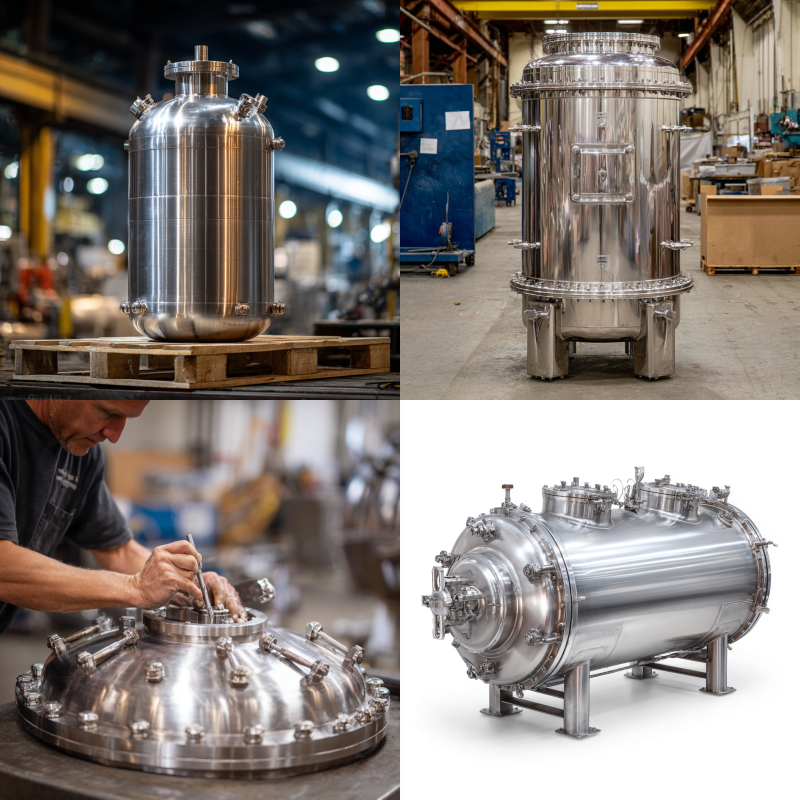
What Is a Stainless Steel Pressure Vessel? Key Facts You Should Know
Understanding What Is a Stainless Steel Pressure Vessel and Its Benefits
If you have ever asked yourself “what is a stainless steel pressure vessel,” you are in the right place. These specialized containers safely hold gases or liquids at pressure levels higher than normal atmospheric conditions. They appear in industries ranging from energy and chemical production to agriculture and mineral extraction, often ensuring regulatory compliance and reducing overall space requirements. By choosing stainless steel, you benefit from corrosion resistance, easy cleaning, and consistent performance over a long lifespan.
Good news, too: thanks to strict manufacturing standards, these vessels maintain reliable quality in even the harshest environments. They can be designed to withstand big temperature shifts, chemical exposure, and internal pressures without leaking or failing. You will often see them used in systems that require material purity, such as pharmaceutical processing or food production.
The versatility of stainless steel pressure vessels makes them indispensable across multiple sectors. In the petrochemical industry, they handle corrosive chemicals and extreme temperatures. Food and beverage manufacturers rely on them for sterile processing and storage. Pharmaceutical companies use them for critical applications where contamination must be absolutely prevented.
Common applications and benefits
Stainless steel pressure vessels are a smart choice if you need:
- Corrosion-resistance to handle chemical or thermal extremes
- A long-lasting unit requiring minimal ongoing maintenance
- A more hygienic space, especially if you work in food and beverage
- A container that meets strict codes such as ASME certification
Working with ASME pressure vessel manufacturers often ensures that your final product meets industry standards. In many cases, compliance is mandatory for operations such as oil refineries or power plants.
In terms of benefits, stainless steel options excel at:
- Maintaining purity in pharmaceutical or food-related applications
- Offering excellent durability over years of heavy usage
- Simplifying cleaning and sterilization steps
- Ensuring consistent performance even when pushing the limits of temperature or pressure
Material Selection and Design Considerations
The selection of appropriate stainless steel grades is crucial for vessel performance. Common grades include 304, 316, and 316L, each offering different levels of corrosion resistance and mechanical properties. Grade 316L is particularly popular in pharmaceutical and food processing applications due to its superior resistance to chloride corrosion and lower carbon content.
Design factors include wall thickness calculations, nozzle configurations, and internal components like baffles or agitators. Engineers must consider operating conditions such as maximum allowable working pressure (MAWP), temperature ranges, and the specific properties of contents being stored or processed.
Proper material selection ensures optimal performance and longevity in demanding industrial environments while meeting specific application requirements and regulatory standards.
Advanced design considerations include thermal expansion calculations, fatigue analysis for cyclic loading, and stress concentration factors around openings and attachments. Computer modeling and finite element analysis help optimize designs for specific applications while ensuring code compliance.
Prefabrication for improved quality
Prefabricating a stainless steel pressure vessel inside a controlled environment leads to faster production times and fewer on-site hazards. According to Red River, this approach significantly reduces weather-related delays, cuts shipping costs, and helps maintain higher quality standards. Everything from welding to materials inspection happens under optimal conditions, so you limit the chances of rework down the road.
When you choose to work with a team experienced in pressure vessel fabrication, you also tap into their existing supply chains for stainless steel. That streamlines your build schedule and adds efficiency. Prefabrication can include full modular skid assemblies (pumps, valves, instrumentation) mounted around the vessel, which arrive ready for quick installation.
The controlled shop environment allows for superior weld quality, precise dimensional control, and comprehensive testing before shipment. Quality assurance procedures can be implemented more effectively in a shop setting, resulting in higher reliability and reduced field modifications.
Safety and Compliance Standards
Safety is paramount in pressure vessel design and operation. All vessels must comply with relevant codes such as ASME Section VIII, which provides comprehensive guidelines for design, fabrication, inspection, and testing. These standards ensure vessels can safely contain pressurized contents without risk of catastrophic failure.
Regular inspections are mandatory, including initial fabrication inspections, hydrostatic testing, and periodic in-service examinations. Documentation and certification are essential for maintaining compliance throughout the vessel’s operational life.
Proper adherence to these safety protocols protects personnel, equipment, and facilities from potentially dangerous pressure-related incidents. Qualified inspectors verify welds, materials, and construction methods meet code requirements before vessels enter service.
Safety systems include pressure relief devices, emergency venting, and monitoring instrumentation. These protective measures ensure safe operation even under abnormal conditions. Training personnel in proper operating procedures and emergency response protocols is equally important for maintaining safe operations.
Maintenance and Longevity
Proper maintenance extends vessel lifespan significantly. Stainless steel’s inherent corrosion resistance reduces maintenance requirements compared to carbon steel alternatives. However, regular cleaning, inspection of welds, and monitoring of operating conditions remain important for optimal performance.
Preventive maintenance includes checking safety relief devices, inspecting external surfaces for signs of stress or corrosion, and ensuring proper operation of instrumentation and controls. Regular pressure testing and documentation help maintain compliance with safety standards.
Well-maintained stainless steel pressure vessels can operate safely for decades with minimal downtime. This longevity makes them a cost-effective investment for industrial applications requiring reliable, long-term performance in demanding environments.
Industry Applications and Case Studies
Stainless steel pressure vessels serve critical roles across numerous industries. In pharmaceutical manufacturing, they maintain sterile conditions for drug production. The food industry uses them for processing, storage, and packaging operations where hygiene is paramount. Chemical plants rely on their corrosion resistance for handling aggressive substances.
Power generation facilities use these vessels for steam systems, water treatment, and fuel handling. The aerospace industry employs specialized pressure vessels for propellant storage and life support systems. Each application demands specific design considerations and material properties.
Oil refineries, biotechnology companies, and water treatment plants also depend on these versatile containers for safe, reliable operations in demanding environments.
Key Facts About What Is a Stainless Steel Pressure Vessel
What is a stainless steel pressure vessel? It is a robust, corrosion-resistant container built to hold pressurized contents safely. By combining the right materials, adherence to codes, and prefabrication methods, you get a vessel that meets your operational goals while complying with industry regulations.
Choosing an ASME-certified provider with proven expertise ensures quality, durability, and performance. Whether your work is in energy, food processing, or chemical production, investing in a stainless steel pressure vessel delivers long-term safety, compliance, and value.
These vessels offer superior hygiene, easy maintenance, and reliable operation across diverse industrial applications, making them the preferred choice for critical pressure-containing systems.
Need a reliable partner?
Red River specializes in the design and manufacturing of pressure vessels. We also fabricate related items such as prefabricated spools and modular skids.
Reach out to us today and experience the Red River difference. Where American-made products and American Values come together, we care more.
Frequently asked questions
1. What is the cost of stainless steel pressure vessels?
The cost of stainless steel pressure vessels typically ranges from $5,000 for small laboratory units to over $500,000 for large industrial systems, with pricing determined by factors such as size, material grade, pressure rating, design complexity, and ASME certification requirements.
2. What are stainless steel pressure vessel manufacturers?
Stainless steel pressure vessel manufacturers are specialized fabrication companies that design, engineer, and build custom pressure vessels using stainless steel materials, typically holding ASME certifications and offering services from initial design consultation through final testing, delivery, and installation support for various industrial applications.
3. What certifications should I look for when choosing a manufacturer?
Look for ASME certification (U4 or R stamps) and membership in recognized organizations like the American Welding Society. A reputable vessel manufacturer will highlight these credentials.
4. Can I have a vessel customized for my facility?
Absolutely. Many companies specialize in custom builds to match your space, temperature range, and pressure demands, often delivering the finished assembly as a prefabricated skid package.
5. How do I improve the lifespan of my stainless steel pressure vessel?
Regular cleaning, scheduled inspections, and periodic maintenance all help. Stainless steel generally performs well under stress, but a proactive approach keeps it in prime condition.
6. Is it necessary to have a prefabricated stainless steel vessel?
Prefabrication is not mandatory, but it can expedite timelines, reduce site disruptions, and lower your exposure to potential on-site hazards.
Key takeaways
- Stainless steel pressure vessels excel in corrosion-resistance, durability, and hygiene.
- Prefabrication saves time, boosts quality, and may reduce your overall costs.
- Checking certifications such as ASME ensures you get a vessel built to industry standards.
- Regular inspection and maintenance extend the vessel’s service life.
- Working with experienced professionals can streamline design, manufacturing, and installation.
